A share buyback tax to boost growth and fund public services
Liberal Democrats are calling for a bold share buyback tax that would incentivise productive business investment, support the transition to net-zero and help raise vital funds for our public services.
Liberal Democrats have reiterated our call for a 4% share buyback tax, paid by the 100 biggest corporations on the stock exchange, similar to the buyback tax introduced in the United States by President Biden.
What could it pay for?
The move could raise around £1.4 billion a year, more than enough to pay for extending Free School Meals to an additional 900,000 children growing up in poverty. A fair tax to correct a huge injustice and offer help with the cost-of-living crisis.
How do share buybacks work?
Share buybacks occur when large corporations use their profits to inflate their own share price in the stock market. They are a controversial practice that economists criticise for coming at the expense of productive investment in the economy.
Why is taxing buybacks the right thing?
Most share buybacks are by oil and gas giants, big banks and multinational conglomerates that own a number of food and consumer goods brands. In other words, buybacks are being driven by the corporations who are profiting most from soaring prices during the cost-of-living crisis.
These companies have been making huge, unexpected profits, and they’re spending vast sums on buying back their own shares. Buybacks totalled £52 billion last year, and companies announced another £27 billion in the first three months of this year alone.
Why is a buyback tax good for the economy?
Instead of reinvesting their profits in skills, equipment or clean technology, many big corporations are just buying back shares to inflate their own share price. That’s holding back the economic growth we need to create jobs and raise living standards.
Our share buyback tax would incentivise companies to change their behaviour and invest more of their money in the things that grow our economy and help tackle the climate emergency. More investment will also strengthen the public finances, helping to bring down the national debt.
In 2023, BP spent five times more money on share buybacks than on low-carbon energy. That’s simply not right.
Why could this raise £1.4 billion?
Based on current buyback levels, a 4% tax would raise around £2.2bn a year. We have taken a cautious approach to account for potential changes in company behaviour, estimating it would raise around £1.4bn a year.
Who else agrees with us?
President Biden: He introduced a similar buyback tax that has already raised around $8 billion in the US and is expected to raise $74bn over 10 years. He said the tax would “encourage corporations to invest in productivity and the broader economy rather than windfalls for investors.”
Independent experts: The respected IPPR think tank has also called for a share buyback tax in the UK, saying it would help raise tax revenue and encourage productive investment.
What if companies stop doing buybacks completely and pay dividends instead?
A 4% tax is not nearly high enough to make companies replace all their buybacks with dividends. The higher a tax is the more it changes behaviour, and 4% is a low rate.
Buybacks and dividends are not the same – they serve very different purposes. Buybacks are a way of keeping profits inside a company. They have a much more direct effect on raising share prices. And unlike dividends, they give existing shareholders a bigger stake in the company.
Companies may reduce buybacks in response to our tax, but our cautious estimate of what it will raise takes that into account.
Go to Source
Author:
